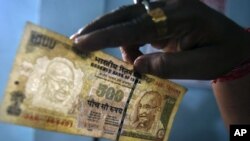After slumping to its lowest-ever level against the dollar nearly two weeks ago, India's currency, the rupee, has recovered marginally. The rupee has lost nearly 15 percent of its value in the last four months, sliding to record lows and assing to India's economic woes at a time with inflation is running high.
Economists say that the weakening rupee will make it more difficult to fight inflation, which has been running at over 10 percent for more than a year, and has emerged as the biggest headache for policymakers.
The decline in the value of the rupee is not good news for India because it will lead to a surge in the country’s import bill, says cconomist D.K. Joshi at Crisil consultancy in Mumbai.
“Economy as a whole is a loser because we import more than we export. So such sharp depreciation can be inflationary in nature. And particularly at this juncture when inflation is quite high and we could have benefited a bit from the decline in global food and commodity prices, that benefit we have not got,” Joshi says.
The Central Bank has stepped in to stem the sharp depreciation by selling dollars and buying rupees. But analysts say its options are limited because it needs to keep its foreign reserves intact.
Many Asian currencies have fallen against the dollar in recent months, but the Indian rupee has been the worst hit, triggered by the flight of investment money from the country.
Economist D.K. Joshi says India relies heavily on inflows into its stock markets, but foreign investors have been pulling out billions of dollars.
“Clearly I think in the last four months, because of risk aversion in Europe, the supply of dollars into the Indian equity markets has reduced. Actually there has been a net outflow, but we are used to getting net inflows.”
Foreign capital is unlikely to return until the global financial crisis eases. There are fears that any deterioration in the eurozone crisis will make it even more difficult for India to attract foreign capital.
The Indian currency is not expected to recover significantly any time soon. There were hopes that a recent landmark decision to allow foreign retailers to set up shop in the country would attract foreign investment and give momentum to the economy. But those hopes faded after the reform was put on hold due to political opposition.
Economists say the government is unlikely to go ahead with other reforms such as allowing foreign investment in the aviation sector.
The weakening currency adds to India’s economic woes at a time when growth has begun to slow. The government has revised its growth projections to around 7.5 percent compared to 8.5 percent at the start of the year.
Weakening Currency Adds to India’s Economic Woes









